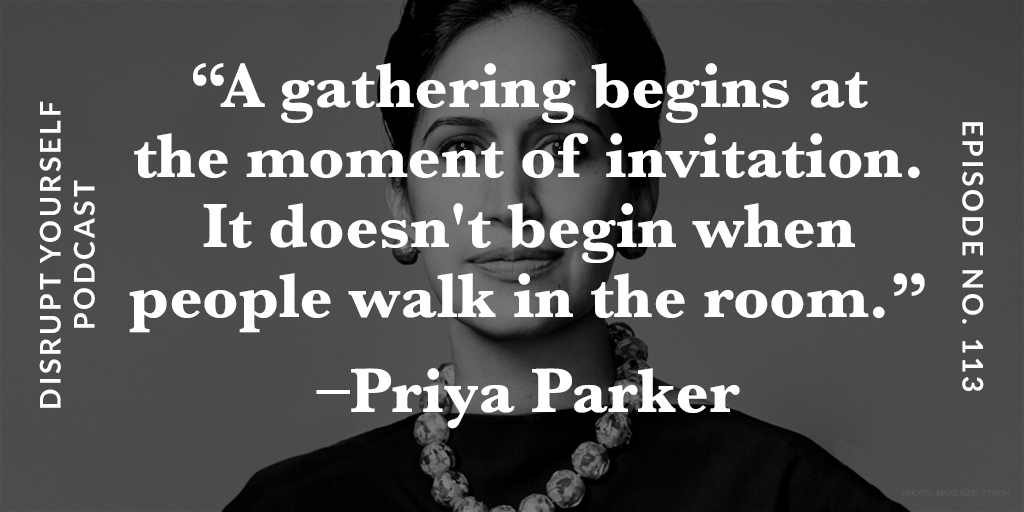My guest today is Priya Parker, the founder of Thrive Labs and a strategic advisor who helps leaders and teams create transformative gatherings. She is the author of The Art of Gathering: How We Meet and Why It Matters, and was featured on the TED2019 stage in April.
In a world full of meetings, how many of them are transformative? It’s an impressive word for something so common, but for Priya, every gathering has the potential to be meaningful and memorable.
“The first step to creating more meaningful transformative gatherings is to just pause and say what is the purpose of this gathering? … Many gatherings are not transformative or meaningful because there is a collection of implicit purposes.”
Whether it’s a board meeting or a wedding, Priya emphasizes that rather than start with the guest list and work backwards into our purpose (a bad habit many of us have), we should instead carefully deliberate on the purpose and then decide on who needs to be there.

“We tend to over include, because we don’t know how to say “no” or there is not a culture of being able to say, “It doesn’t make sense for you to be here.” But when you actually figure out who should be there for the purpose, then it doesn’t feel so personal when you don’t invite everybody. It’s purposeful.”
In all her years of research, one important fact stands out to Priya—never take for granted the time we have with other people.
Join us as we discuss the role of a host, the true moment a gathering begins (hint: it’s not when you think!), and the important power of endings.
Listen on iTunes or in the player above, and if you enjoy the show, please consider clicking here to leave us a review.
Takeaways from this episode:
- Every gathering is unique. You can’t replicate another gathering because each group of individuals will have “its own unique chemical composition.”
- “A gathering begins at the moment of invitation. It doesn’t begin when people walk in the room.”
- It’s important to realize that gatherings are something you can influence. We need to pause and see them as units that can have power and meaning.
- Purpose is critical, but we need to make it obvious. Don’t assume that everyone knows why you are gathering (this includes weddings or other modern rituals that mean different things to different people).
- People have a bad habit of deciding who to invite, and then working backward into the purpose of a gathering. Flip the script on this. For example, if you’re having a get-together to celebrate a new job in a new city, who inspires you to be adventurous? What would happen if you just invited those people? How would that impact your gathering?
- It’s ok to not invite people. Make purpose your bouncer.
- Your setting or environment should match the purpose. As Jerry Seinfeld says, “The room is doing 80% of the job.” Don’t be afraid to move chairs, tables, room orientation, etc. to avoid feelings of awkwardness.
- Hosting is an exercise of power. “[S]trip away all of the baggage around it and just think of it as decision making.”
- Avoid starting or ending your meeting with logistics, such as where the bathrooms are, what’s up next, thank-yous, etc. “[E]ndings are when meaning is starting to be made of what transpired…as a host, help your group shape meaning together.”
- “Use your power of host to help shape that collective meaning, and to end on what you want people to remember.”
Links Mentioned in this Episode:
- Priya Parker – Website | Twitter | Instagram
- The Art of Gathering: How We Meet and Why It Matters by Priya Parker
- Build an A-Team: Play to Their Strengths and Lead Them Up the Learning Curve by Whitney Johnson
- Download a free chapter from Build an A-Team

